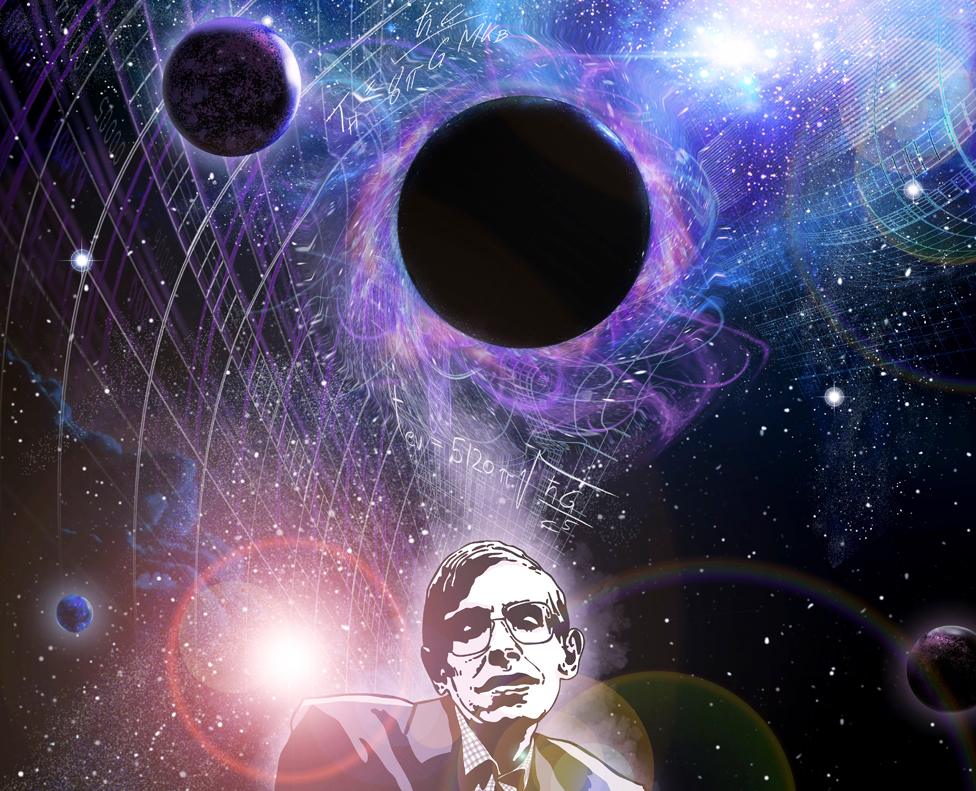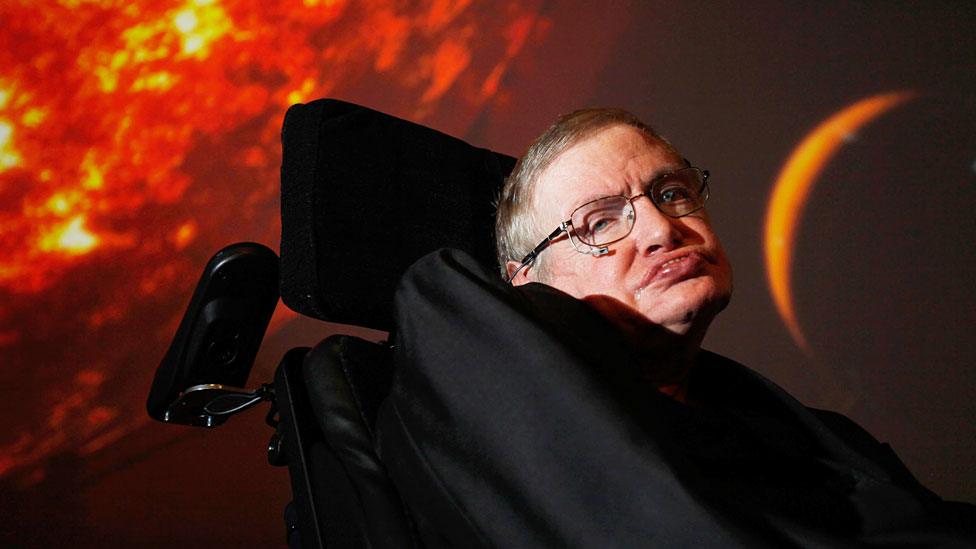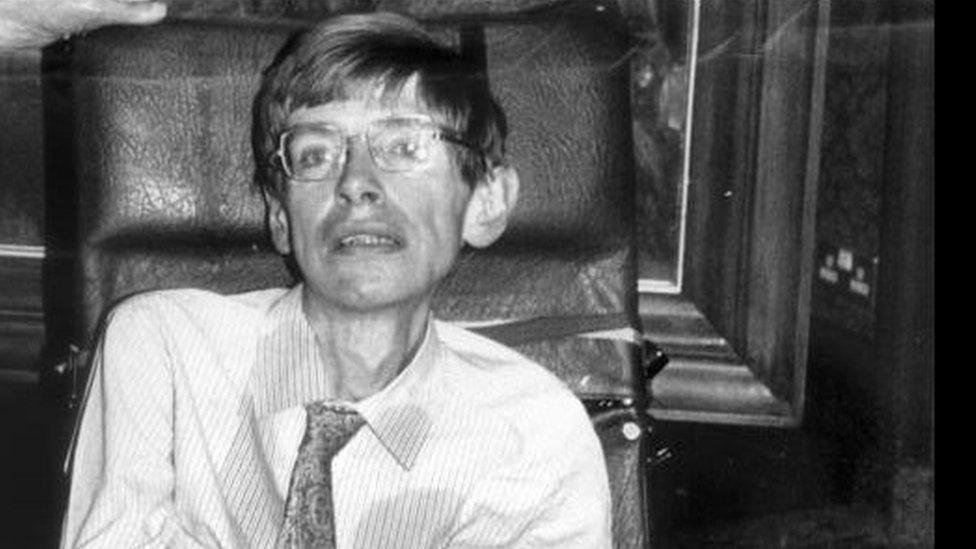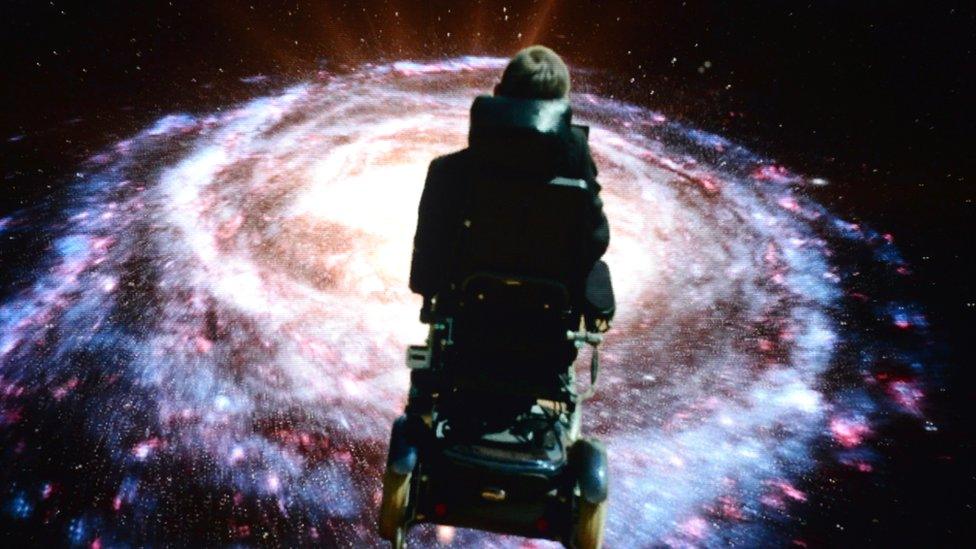Stephen Hawking: Black holes, making science cool and being funny
- Published

Stephen Hawking has died peacefully at home aged 76.
The physicist made his name with theories on black holes and relativity, but he was many things to many people.
Growing up some might have known him best from The Simpsons.
Others might picture Eddie Redmayne when they think of Stephen Hawking, following the actor's Oscar-winning performance in The Theory of Everything.
While to some he might be that genius with the robotic voice.
Here's who he was, what he actually did, and what he was famous for.

Professor Hawking showed that black holes aren't black at all
He was best known for 'Hawking radiation'
Professor Hawking was most famous for his theories around black holes - arguing that they're not actually black at all.
He came up with the idea that the dense objects which exist in space give off heat, and eventually will completely evaporate and explode.
"Black holes are these incredibly dense objects that suck stuff into (them) through gravity, and it was thought that nothing can escape," explains particle physicist Harry Cliff.
"By combining quantum mechanics and the theory of gravity, Hawking showed that they can actually evaporate, and could eventually even explode like a nuclear bomb."
And the big bang theory
The big bang theory wasn't just a show that Professor Hawking appeared in.
Allow X content?
This article contains content provided by X. We ask for your permission before anything is loaded, as they may be using cookies and other technologies. You may want to read X’s cookie policy, external and privacy policy, external before accepting. To view this content choose ‘accept and continue’.

"One of the first things Stephen Hawking worked on was the idea of the big bang," Dr Cliff says.
"This is the point at the beginning of the universe, where the universe is infinitely small and infinitely dense.
"Hawking showed that actually, at that very early moment there was something called a singularity where space and time break down.
"From that tiny point the whole universe began and there's this rapid expansion of space and time."
He helped popularise science
Let's be honest - compared to the number of scientists out there, there aren't actually that many who are household names. It's not a profession people go into for the fame.
But Professor Hawking managed to take complicated theoretical arguments and make them accessible and relevant to regular people.
His book A Brief History of Time, which was published in 1988, has sold millions of copies.
"Apart from his scientific work Hawking's biggest contribution was his popularisation of science," says Dr Cliff.
He was also really funny
Allow X content?
This article contains content provided by X. We ask for your permission before anything is loaded, as they may be using cookies and other technologies. You may want to read X’s cookie policy, external and privacy policy, external before accepting. To view this content choose ‘accept and continue’.

There are so many examples of Stephen Hawking displaying his great sense of humour - including his many appearances on shows like The Simpsons, Futurama, and The Big Bang Theory.
One of our favourites at Newsbeat was when he was interviewed by John Oliver on Last Week Tonight.
The TV host said: "You've stated that you believe there could be an infinite number of parallel universes. Does that mean that there is a universe out there where I am smarter than you?"
Professor Hawking replied: "Yes. And also a universe where you're funny."
Another example of him living by his famous quote "life would be tragic if it weren't funny", is the time he left a BBC Newsnight presenter terrified they'd unplugged Stephen Hawking.
Allow X content?
This article contains content provided by X. We ask for your permission before anything is loaded, as they may be using cookies and other technologies. You may want to read X’s cookie policy, external and privacy policy, external before accepting. To view this content choose ‘accept and continue’.
The physicist also helped soothe the broken hearts of One Direction fans in 2015, when Zayn Malik left the group.
"My advice to any heartbroken young girl is to pay close attention to the study of theoretical physics," he said.
"One day there may well be proof of multiple universes.
"It would not be beyond the realms of possibility that somewhere outside of our own universe lies another different universe. And in that universe, Zayn is still in One Direction."
He added: "This girl may like to note that in another possible universe she and Zayn are happily married."
Bringing science to the masses.
He was a campaigner
Allow X content?
This article contains content provided by X. We ask for your permission before anything is loaded, as they may be using cookies and other technologies. You may want to read X’s cookie policy, external and privacy policy, external before accepting. To view this content choose ‘accept and continue’.
Professor Hawking was diagnosed with motor neurone disease at 22 and had to rely on the NHS multiple times throughout his life.
He publicly backed Labour in the 2017 general election and strongly criticised Health Secretary Jeremy Hunt the same year.
The Cambridge graduate said he was worried about the future of the health service, and with a group of campaigners was given permission to challenge a government health policy in the High Court.
"The more profit is extracted from the system, the more private monopolies grow and the more expensive healthcare becomes.
"The NHS must be preserved from commercial interests and protected from those who want to privatise it," he previously said.
Allow X content?
This article contains content provided by X. We ask for your permission before anything is loaded, as they may be using cookies and other technologies. You may want to read X’s cookie policy, external and privacy policy, external before accepting. To view this content choose ‘accept and continue’.
He's also spoken on mental health.
In particular, Professor Hawking was praised for quotes interpreted by some as being about depression in a speech at the Royal Institution in London in 2016.
"The message of this lecture is that black holes ain't as black as they are painted," he said.
"They are not the eternal prisons they were once thought.
"Things can get out of a black hole both on the outside and possibly to another universe. So if you feel you are in a black hole, don't give up - there's a way out."
Follow Newsbeat on Instagram, external, Facebook, external and Twitter, external.
Listen to Newsbeat live at 12:45 and 17:45 every weekday on BBC Radio 1 and 1Xtra - if you miss us you can listen back here.
- Published14 March 2018

- Published14 March 2018

- Published14 March 2018

- Published14 March 2018

- Published14 March 2018

- Published14 March 2018

- Published14 March 2018

- Published14 March 2018
